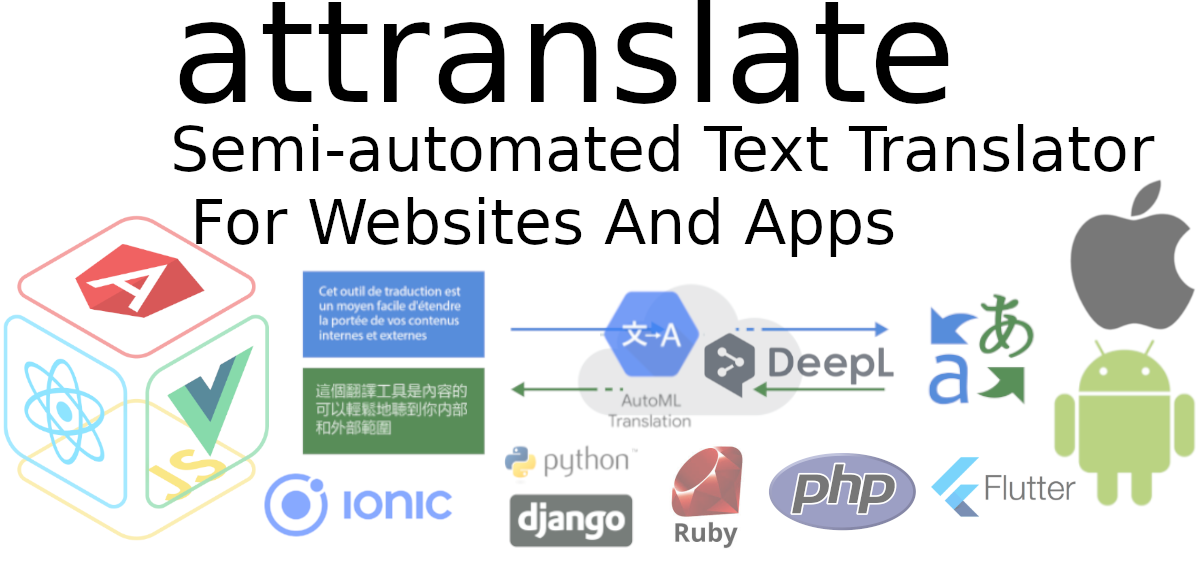attranslate is a tool for synchronizing translation-files, including JSON/YAML/XML and other formats.
attranslate is optimized for smooth rollouts in hectic project environments, even if you already have many translations.
Optionally, attranslate works with automated translation-services.
For example, let's say that a translation-service achieves 80% correct translations.
With attranslate, a quick fix of the remaining 20% may be faster than doing everything by hand.
Other than that, attranslate supports purely manual translations or even file-format-conversions without changing the language.
In contrast to paid services, a single developer can integrate attranslate in a matter of minutes.
attranslate can operate on the very same translations-files that you are already using.
This is possible because attranslate operates on your file in a surgical way, with as little changes as possible.
attranslate is designed to translate any website or app.
attranslate works for i18n/JavaScript/Android/iOS/Flutter/Ruby/Jekyll/Django/WordPress and many other platforms.
To make this possible, attranslate supports the following file formats:
- Flat or nested JSON
- YAML
- PO/POT-files
- Android-XML or other XMLs
- iOS-Strings
- Flutter-ARB
- CSV (e.g. for Google Docs or Excel)
attranslate recognizes that machine translations are not perfect.
Therefore, whenever you are unhappy with the produced text, attranslate allows you to simply overwrite text in your target-files.
attranslate will preserve manual corrections in subsequent runs.
attranslate supports the following services; many of them are free of charge:
openai: Uses a model like ChatGPT; free of charge- google-translate: Needs a GCloud account; free up to a limit
- azure: Needs a Microsoft account; costs money
sync-without-translate: Does not change the language. This can be useful for converting between file formats, or for maintaining region-specific differences.manual: Translates text with manual typing
Translating a single file is as simple as the following line:
attranslate --srcFile=json-simple/en.json --srcLng=English --srcFormat=nested-json --targetFile=json-simple/es.json --targetLng=Spanish --targetFormat=nested-json --service=openai
If you have multiple target-languages, then you will need multiple calls to attranslate.
You can write something like the following script:
# This example translates an english JSON-file into spanish and german.
BASE_DIR="json-advanced"
COMMON_ARGS=( "--srcLng=en" "--srcFormat=nested-json" "--targetFormat=nested-json" "--service=google-translate" "--serviceConfig=gcloud/gcloud_service_account.json" )
# install attranslate if it is not installed yet
attranslate --version || npm install --global attranslate
attranslate --srcFile=$BASE_DIR/en/fruits.json --targetFile=$BASE_DIR/es/fruits.json --targetLng=es "${COMMON_ARGS[@]}"
attranslate --srcFile=$BASE_DIR/en/fruits.json --targetFile=$BASE_DIR/de/fruits.json --targetLng=de "${COMMON_ARGS[@]}"Similarly, you can use attranslate to convert between file-formats.
See sample scripts for more examples.
Firstly, ensure that nodejs is installed on your machine.
Once you have nodejs, you can install attranslate via:
npm install --global attranslate
Alternatively, if you are a JavaScript-developer, then you can install attranslate via:
npm install --save-dev attranslate
Next, you should write a project-specific script that invokes attranslate for your specific files.
See sample scripts for guidance on how to translate your project-specific files.
Run attranslate --help to see a list of available options:
Usage: attranslate [options]
Options:
--srcFile <sourceFile> The source file to be translated
--srcLng <sourceLanguage> A language code for the source language
--srcFormat <sourceFileFormat> One of "flat-json", "nested-json",
"yaml", "po", "xml", "ios-strings",
"arb", "csv"
--targetFile <targetFile> The target file for the translations
--targetLng <targetLanguage> A language code for the target language
--targetFormat <targetFileFormat> One of "flat-json", "nested-json",
"yaml", "po", "xml", "ios-strings",
"arb", "csv"
--service <translationService> One of "openai", "manual",
"sync-without-translate",
"google-translate", "azure"
--serviceConfig <serviceKey> supply configuration for a translation
service (either a path to a key-file or
an API-key)
--matcher <matcher> One of "none", "icu", "i18next",
"sprintf" (default: "none")
--overwriteOutdated <true | false> If true, overwrite outdated translations
in subsequent runs. Leave this at false
unless you know what you are doing.
(default: "false")
-v, --version output the version number
-h, --help display help for command
⚠️ For many projects,attranslateworks out of the box without configuring any matchers. Therefore, we recommend skipping this section.
Many websites/apps insert dynamic values into translations.
For example, a translation like Your name is {{name}} might be replaced with Your name is Felix.
To help with with this, attranslate offers the following matchers for different styles of replacements:
- ICU: Matches something like
{name}. - i18n: Matches i18next format like
{{name}}. - sprintf: Matches sprintf-style like
%s.
⚠️ By default,attranslatedoes not generate any translation-cache, therefore you may skip this section as well.
By default, attranslate never overwrites any outdated translations.
Nevertheless, attranslate provides an option to detect outdated translations.
It is the purpose of the translation-cache is to detect such outdated translations.
The translation-cache consists of attranslate-cache-*-files.
To detect common mistakes like missing translations, it is advisable to run attranslate via continuous integration (CI).
For example, the command git diff --exit-code can be used to trigger a CI failure whenever a file has been modified by attranslate.
